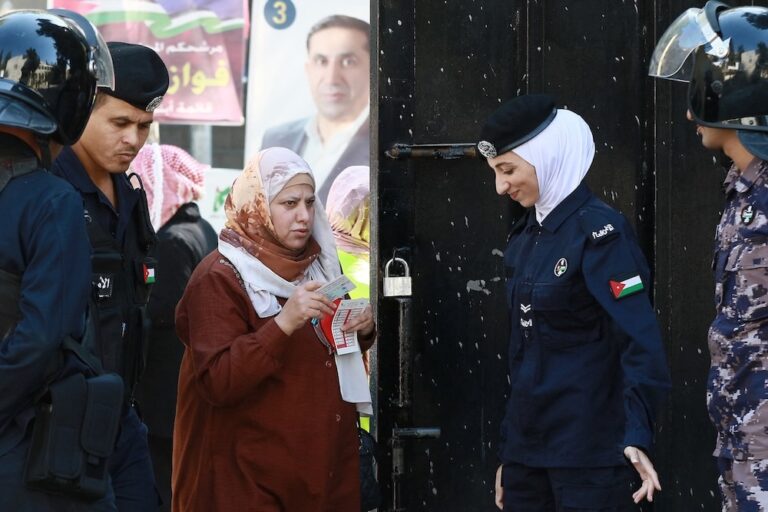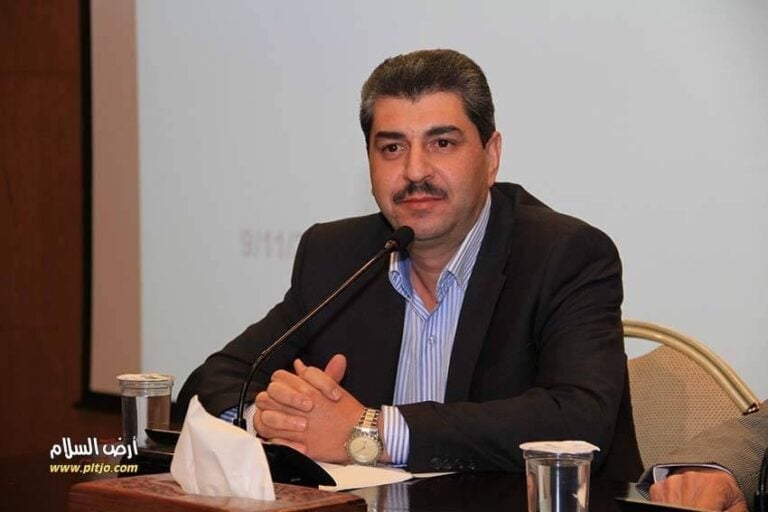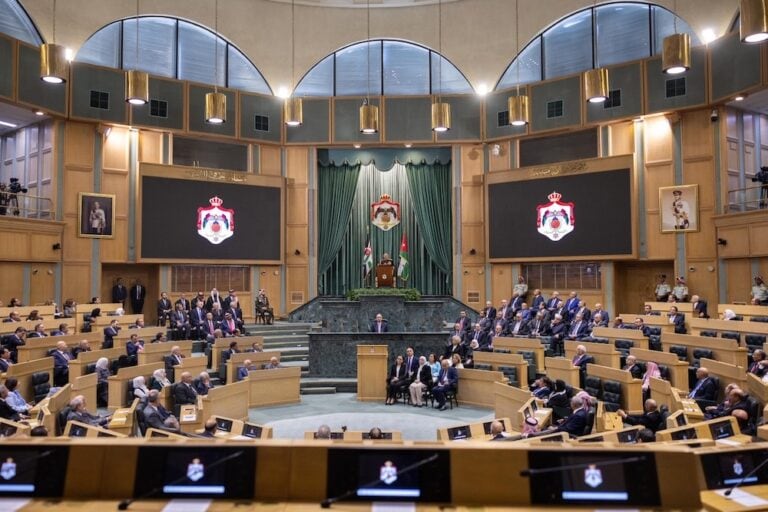Journalists persecuted for online expression, and new cybercrime law ratified.
This statement was originally published on gc4hr.org on 14 August 2023.
The authorities in Jordan continue their systematic policies of targeting human rights defenders and restricting the freedom of journalists and other activists who express their opinions on public affairs that relate to the daily lives of citizens.
Journalist Hiba Abu Taha
On 9 August 2023, journalist Hiba Abu Taha was released after she was arrested the previous evening and spent 24 hours in detention. Her release came after she appealed the verdict issued against her. The verdict is related to a charge directed against her, which is the slander of an official body based on a post she published on her Facebook page.
On 14 June 2023, Amman Criminal Court issued a three-month prison sentence against her, subject to appeal, in accordance with Article (191) of the Jordanian Penal Code and Article 15 of the Cybercrime Law.
Abu Taha is a Jordanian-Palestinian investigative journalist and blogger who uses her Facebook page to express her critical opinions about government policies.
On 11 August 2023, she posted the following on her page, “Enough repression and brutality with the sword of customary laws, and release the detainees.”
Journalist Ahmed Hassan Al-Zoubi
On 9 August 2023, the Amman First Instance Court, in its capacity as an appeals court, decided to annul the sentence issued against journalist Ahmed Hassan Al-Zoubi of two months in prison, and ordered him to be imprisoned for a full year, in addition to imposing a fine of 50 Jordanian dinars (70 dollars) on him and requiring him to cover the costs of legal procedures.
This ruling came after the court convicted him of allegedly “inciting sectarian and racial strife and inciting conflict between the sectors of the nation.” This is related to a post he wrote on his Facebook page during the strike of transport truck drivers in Ma’an Governorate in December 2022 against the rise in fuel prices, in which he criticised the authorities’ handling of the events that accompanied the strike.
Al-Zoubi, 48 years old, is a journalist and satirical writer. He was writing for the Gulf press between 2000 and 2006, then he became prominent in 2004 when he started writing for the official, state-owned Al-Rai newspaper. He is also a playwright who authored several plays, including the famous play “Al’An Fahimtkum” in 2011, and “Bleeding Solo” in 2012. He is also the founder and editor-in-chief of the Sawaleif website, which deals with all important local and international issues and has contributions by several other journalists and writers.
He uses his Facebook page to write his frank opinions on various hot topics going on in the country. On 10 May 2023, he urged citizens to join the Partnership and Rescue Party, which was established in 2017, in a Facebook post, in which he said, “Harmony with oneself when we take a practical step that translates our principles, and gets rid of our grumbling in secret, peoples rise by organisation, unity and real construction… be a partner in saving the country.”
Activist Dr. Ibrahim Al-Mansi
On 10 August 2023, the Court of Appeal issued a four-month prison sentence against the coordinator of the Popular Campaign for the Defense of the Holy Qur’an, Dr. Ibrahim Al-Mansi, in the case brought against him by the Minister of Awqaf (Endowments) for his defense of the Association for the Preservation of the Holy Qur’an. The appeal ruling came after the Court of First Instance decided he had “non-responsibility” and dismissed the complaint.
On 12 August 2023, he wrote on his Facebook page the following, “I will not hesitate to defend the Association for the Preservation of the Holy Qur’an, whatever the cost.”
The Ministry of Awqaf had filed a case against him of defamation due to his posts on social media defending the Association for the Preservation of the Holy Qur’an and announcing his refusal to close some of its centres.
King Abdullah ratifies the Cybercrime Law
Despite repeated appeals from civil society organisations and various citizens, including journalists and bloggers, on 12 August 2023, King Abdullah II issued a decree approving the draft Cybercrime Law 2023. This law, which faced widespread rejection in the country, will be effective once published in the Official Gazette.
On 26 July 2023, the Gulf Centre for Human Rights (GCHR) issued an appeal noting, “The law, which contains 41 articles, includes several articles that use broad and vague terms that violate the right to freedom of expression online and threaten digital rights, including the right to privacy.” It also provides for prison sentences of up to three or five years.
Appointing the president and members of the National Centre for Human Rights
On 3 August 2023, a royal decree was issued appointing the president and members of the National Centre for Human Rights (NCHR), which is affiliated with the government and funded by it. These appointments have faced widespread criticism by human rights activists and bloggers as most of those appointed have not previously worked independently and effectively to defend the civil and human rights of citizens, in addition to the fact that the NCHR, since the promulgation of its founding law in 2006, has not worked diligently in order to stop the grave violations committed by the authorities on a daily basis.
Recommendations
The Gulf Centre for Human Rights (GCHR) calls on the Jordanian authorities to:
- Release the coordinator of the “Popular Campaign for the Defense of the Holy Quran,” Dr. Ibrahim Al-Mansi, and stop targeting the prominent journalist Ahmed Hassan Al-Zoubi and journalist Hiba Abu Taha;
- Respect and not restrict freedom of expression and opinion, and allow Internet activists to use cyberspace without restricting their activities, as stipulated in Article 15 of the Jordanian Constitution;
- Respect Jordan’s international commitments to international conventions that guarantee freedom of opinion and expression, foremost of which is the Universal Declaration of Human Rights and the International Covenant on Civil and Political Rights; and
- Fulfil its constitutional duties, represented in protecting the civil and human rights of citizens, by rejecting and withdrawing the draft anti-cybercrime law immediately, and working to protect freedom of expression online and offline.



